Economist Impact, supported by Google, conducted a survey of 1,375 employees across Asia-Pacific (APAC), including 100 employees from Indonesia, between November 2022 and January 2023. It also interviewed employers and industry experts across the region to understand their perspectives on skills gaps, as well as reskilling and upskilling aspirations.
The survey respondents were drawn from across 14 markets in the region, out of which 11.8% were Gen Z (born in 1997-2012), 63.2% were Millennials (1981-96) and 25% were Gen X (1965-80). They all worked in a diverse mix of industries.
The research shows that across the region, common understanding is lacking between employers and employees about future skills and the best way to develop them. In some instances, there is also an expectation mismatch between what employers want and what employees see as being important. Understanding these gaps will be instrumental in creating a workforce that is prepared for the economy of the future.
This article—one in a series of 12 market reports—examines these issues in Indonesia. This series complements a research paper that looks at the reskilling and upskilling imperative across APAC.
Key findings
- Indonesian employees consider digital skills (60%) the top focus area for upskilling. Among these, basic digital skills are foundational for 88.3% of Indonesian workers.
- As digitalisation spreads across the archipelago, the country will increasingly demand more advanced skills. Employees consider capabilities with data analysis and visualisation (56.7%), IT support (51.7%), and digital marketing and e-commerce (48.3%) as the most important advanced tech skills to have.
- Workers have the highest expectations for their employers, believing they should support their development by providing information on skills (57%), through financial incentives (54%), recognition (43%) and supporting their mental well-being (35%).
Indonesia is one of Southeast Asia’s fastest-growing internet economy. Between 2015 and 2019, its technology sector grew at an average rate of 49% a year, alongside rapid e-commerce adoption by both large and small businesses.1 The economy’s digitalisation has enabled many in the workforce, especially the young, to participate as freelancers, particularly in the transportation and delivery sectors.2
However, many have been left out due to uneven internet connectivity and low literacy rates. For instance, most internet users tend to be concentrated in urban centres and are young—only 21% are over 50 years old.3 The issues are not just limited to the older population, as almost a quarter of young people (22.5%) in Indonesia are not in education, employment or training4 and the World Bank estimates that only 19% of 25-34 year olds had a tertiary qualification in 2021, much lower than the global average of 47%.5
The future of Indonesia’s economy is digital
Most Indonesian employees (60%) consider digital skills the most important to acquire. This is in sync with the digitalisation underway in the economy — Indonesia’s digitally skilled workers are forecast to contribute US$303.4bn to its GDP by 2030, accounting for 16% of GDP.6
Government analysis shows that the expanding technology sector could create 20m-45m new jobs in Indonesia.7 Between 2019 and 2030, non-tech sectors such as professional services, manufacturing and construction — are expected to see the highest growth in GDP contributions from digitally skilled workers, as these sectors increasingly adopt technology to improve their productivity.8
Figure 1: Digital skills are a top priority for Indonesian employees
Which skill categories do you think are the most important for the workforce in your sector to acquire today? (%)

Source: Economist Impact, 2023
Within the broad category of digital skills, employees in our survey consider advanced digital skills such as data analysis and visualisation (56.7%), IT support (51.7%), and digital marketing and e-commerce (48.3%) as must-have skills. Employees also said the same for coding and programming (26.7%) and artificial intelligence (AI) and machine learning (25%). The importance given to these advanced skills possibly reflects a skills gap, as data from 2020 suggest that less than 1% of the workforce in the country possessed advanced digital skills.9
Advanced digital skills are becoming more important for various sectors too. For instance, big data analytics skills are increasingly used in the banking sector to understand customers’ spending patterns and preferences, to cross-sell products and for fraud management.10 Similarly, AI is expected to improve care delivery and hospital operations.11 Meanwhile, farmers are benefitting in myriad ways from real-time monitoring and prediction systems with Internet of Things-enabled tools.12
Cybersecurity is another must-have advanced digital skill for 36.7% of employees, reflecting Indonesia’s struggles with digital risks. The country was ranked the most vulnerable in Southeast Asia for cyber risks, and faced more than 11m attacks in the first quarter of 2022 alone.13
Although green skills such as sustainability reporting, sustainable business management and supply chain management are considered less important at present(15%), these skills would gain importance due to the country's rising sustainability concerns. Indonesia is ranked among the top countries exposed to climate risks with high vulnerability to all types of flooding and extreme heat. 14
Figure 2: Advanced digital skills such as data analysis and visualisation, and IT support are must-haves
Indicate which specific types of digital skills are must-have, good to have or not needed for the workforce in your sector today (%)
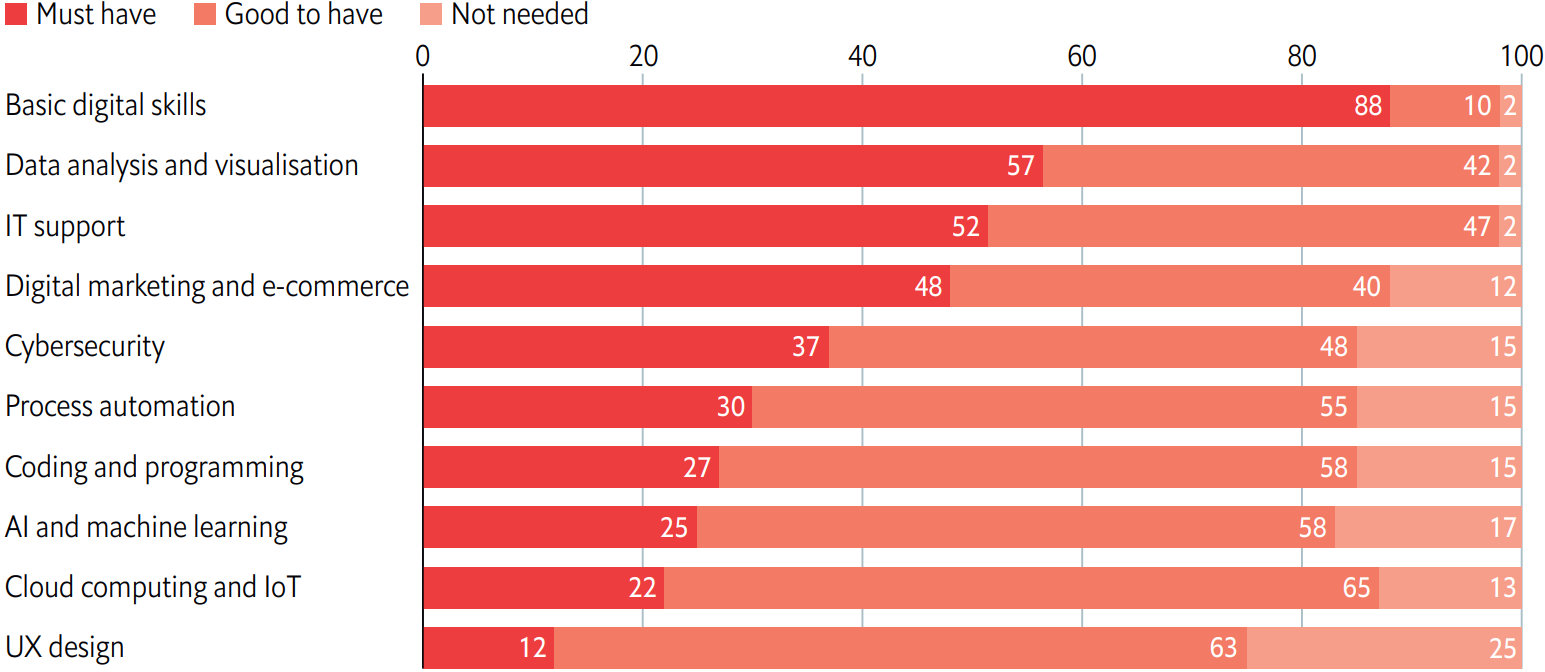
Source: Economist Impact, 2023
Infrastructure and high costs complicate access to skilling
Employees in Indonesia are strongly motivated to acquire new skills. Nearly half (49%) of the employees agree that upskilling or reskilling has had a high impact in improving performance in their current roles, and 54% report a high impact in exploring new roles and areas of interest. Despite these motivations, more than one in four (27%) employees cite poor internet access as a barrier in acquiring new digital skills. Nila Marita, director and head of external affairs at GoTo—the holding company of two major Indonesian startups, Gojek and Tokopedia—agrees that internet connectivity is “crucial to increase access to important learning opportunities in Indonesia and bridging this gap will enable more Indonesians to acquire digital skills.” Addressing access is important, as employees utilise online courses for learning. Indeed, 54% of employees say they obtain digital skills outside of the workplace via online courses.
High costs (42%) are also a major hurdle in Indonesians’ ability to digitally upskill, and companies are not investing enough to provide workers with on-the-job training.15 Additionally, Indonesia has a large, informal sector made up of low-income workers, creating challenges for employees to afford skilling programmes and for the government to reach them.16 17
Figure 3: Key skilling obstacles for employees across skills types
What are the top three significant obstacles that you face while learning new skills?
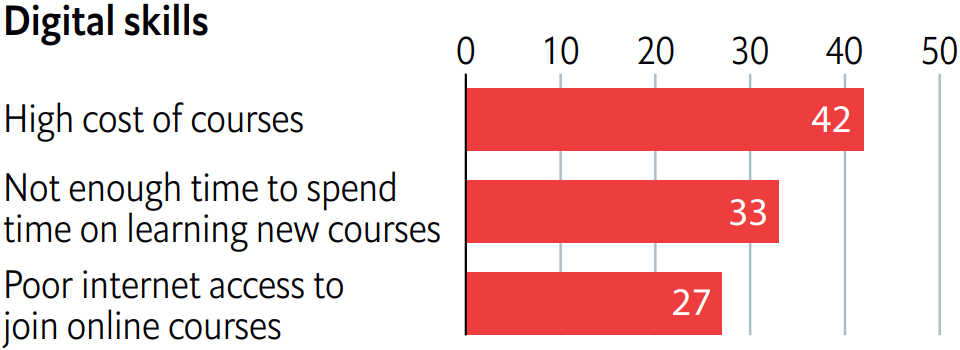
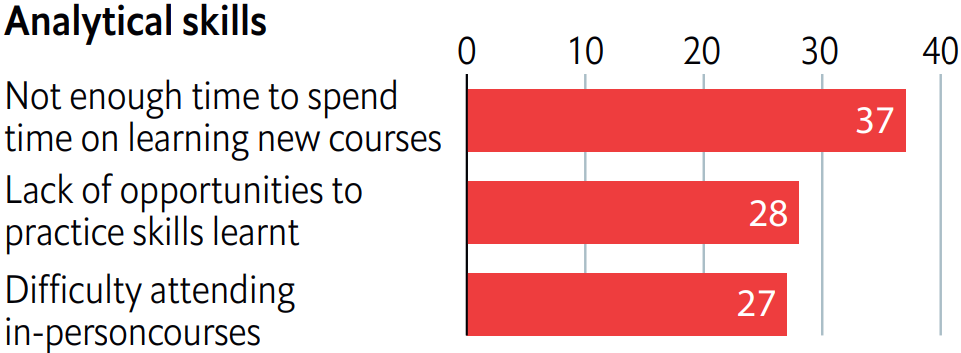
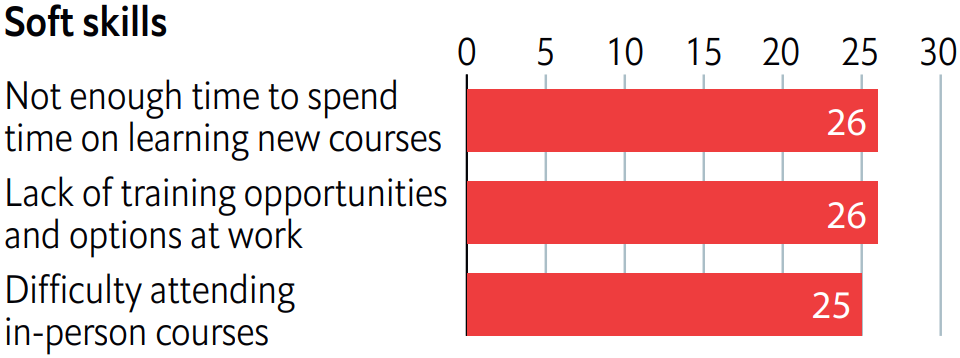
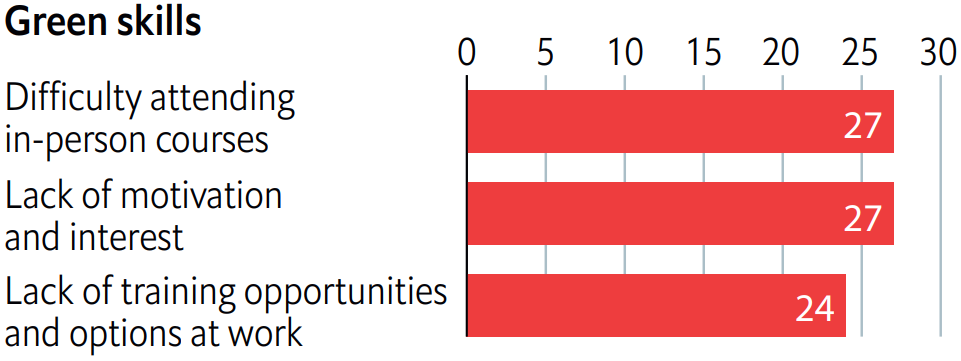
Source: Economist Impact, 2023
Another challenge that employees cite across most skill sets is a lack of time in learning new courses. Indonesian workers have reported experiencing higher workload after the Covid-19 pandemic.18 This also aligns with the higher importance that employees in our survey assign to self-management skills like time management, resilience and stress tolerance (49%).
High expectations from employers
According to our survey respondents, employers are the most responsible for supporting their development across every category apart from providing access to diversified skilling programmes. In particular, they see their employers as a key source of providing information on skills (57%), financial incentives (54%), recognition (43%) and support for their mental well-being (35%).
Employers could address many of the obstacles that employees face such as high costs and time restrictions by subsidising access to training programmes and integrating more workplace training sessions. “Both the government and private sector in Indonesia have been scaling up efforts to develop the country’s talent pool in recent years,” says Ms Marita from GoTo. For instance, organisations and the government are increasingly collaborating with universities to prepare university students with in-demand skills. Private sector companies are also training the trainers and working together with them to design the curriculum based on companies’ skills needs.
Figure 4: Employers are considered the most responsible for upskilling Indonesians
In your opinion who is responsible for supporting employees regarding the following issues? (%)

Source: Economist Impact, 2023
Seventy-seven percent of employees, substantially higher than the regional average (66.5%), believe that employers now lean towards skills-based hiring over paper qualifications. In this context, efforts by government, educational institutions and companies to communicate what skills are in-demand will help the workforce prioritise which ones to learn. While most workers rely on social media and advertisements (73%) for information on valuable skills, government awareness programmes are also an important source for 50% of employees.
Multi-stakeholder collaboration key to closing skills gaps
Overcoming access and infrastructure gaps is integral to realising Indonesia’s digital economic potential. The government has made efforts to counteract these issues through various programmes such as Kartu Prakerja, an online upskilling programme targeted at retraining one million unemployed and low-income adults who are 18-64 years old.19 20 The programme takes an end-to-end approach, providing access to upskilling and reskilling subsidies, courses and job vacancies. Subsidies can also be useful in driving the uptake of green skills, which acts as the biggest motivation to acquire these skills for one in three surveyed employees. Another programme provided by Indonesia’s Ministry of Communications and Information is the Digital Talent Scholarship (DTS). It aims to develop the skills and competitiveness of the country’s workforce in the information and communication technology sector.21
For Indonesia to fully unlock the economic potential of digital skilling, it must extend this kind of opportunity to workers at micro, small and medium enterprises which employ 97% of the country’s workforce.22
Another government programme is Making Indonesia 4.0, a roadmap launched in 2018 to accelerate digitalisation.23 Elements of this roadmap are geared towards training and reskilling workers as technology becomes more ingrained in industrial processes. Additionally, attempts to broaden equitable access to digital skilling opportunities could close the skills gaps.
2 https://fair.work/wp-content/uploads/sites/17/2021/12/Fairwork-Report-Indonesia-2021-accessible.pdf
6 https://accesspartnership.com/wp-content/uploads/2023/03/skills-for-the-future-executive-summary-in-english.pdf
8 https://accesspartnership.com/wp-content/uploads/2023/03/skills-for-the-future-executive-summary-in-english.pdf
9 https://pathwayscommission.bsg.ox.ac.uk/sites/default/files/2022-03/FINAL_Diagnostic%20Report_Accessible.pdf
11 https://www.usa.philips.com/healthcare/nobounds/phoenix-childrens-benefits-of-ai-in-healthcare#_continue-reading
14 https://www.adb.org/sites/default/files/publication/700411/climate-risk-country-profile-indonesia.pdf
16 An informal economy broadly refers to any part of the economy that is unregistered, meaning that they are not covered or are insufficiently covered by formal employment arrangements. In most of these cases, companies remain largely unaccountable to any regulation as workers are not officially classed as employees, limiting their access to government services, including welfare, labour rights protections and public programmes. In Indonesia, 60% of the workforce is employed by the informal sector and accounts for 22.7% of national GDP (US$776 billion).
18 https://en.prnasia.com/releases/apac/68-of-indonesia-s-employees-willing-to-forgo-higher-salaries-or-job-promotions-for-work-life-balance-michael-page-366002.shtml








